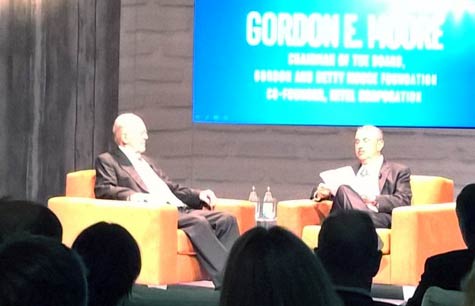One of the lessons a number of companies learned over the last decade or so is that CEOs who don’t have passion for the firm’s products don’t run companies particularly well. The technology companies that define the industry were created by people with passion for product and that passion drove them through all of the huge obstacles between them and the success they eventually achieved. Yet when these people moved on, they tended to bring on business folks to run their firms, and this has mostly ended badly. Michael Dell had to come back in to restore his company after giving it to a business guy and he even took it private again. Steve Ballmer loved the company but had no concept of product. Satya Nadella has restored passion and success to Microsoft. And finally, Intel had a series of executives who really weren’t passionate about product but is also undergoing a very positive change as the result of its latest CEO, Brian Krzanich (BK).
I was reminded of this last point when I attended the Moore’s Law 50th Anniversary last night, effectively seeing a passing of the passion torch from Gordon Moore, the author of Moore’s law, to BK.
Let’s talk about why passion is important and touch a bit on why Moore’s Law is the heartbeat of Silicon Valley.
Steve Jobs
Steve Jobs was a lot of things, both good and bad, but what will always stand out in my mind as his big differentiator is that he loved hardware. I mean, he was passionate about it. This passion pervaded the company (granted, likely because he had a tendency to fire folks who disappointed him on the spot), and it helped drive the firm to become the most valuable company in the world.
This seems too important a lesson to forget. The benefits of passion for the firm’s products are immeasurable. If you look at companies run by passionate CEOs, they typically are at the top of their game. EMC, Dell, Intel, Microsoft, Lenovo, T-Mobile and VMware each seem to stand out positively against their peers and each is defined by the passion of its leading executives.
Managed companies like HP, Oracle, Yahoo, AOL and most other carriers seem to struggle for growth, largely I think because they overly focus on the financial side of the business and forget that the best firms are run by people who care more about doing something amazing and not focusing almost exclusively on financial performance. Ironically, by focusing less on this financial performance, they actually got better long-term financial performance.
In the end, passion leads to happier customers and happier employees. It is a ton more fun to work for someone who gets excited and engaged in products than someone who gets excited and engaged in layoffs.
Moore’s Law: The Heartbeat of Silicon Valley
Speaking of passion, no one is more passionate about technology than Gordon Moore and as he spoke last night, I was reminded about that. I think this goes to the heart of why Intel even exists. Moore, Noyce and Grove loved this stuff and built a company that more than helped redefine an industry that, up until then, was mostly about technology that only the biggest companies could afford.
Moore’s Law, which forecast exponential growth in capability while holding costs almost flat, was compared to the car industry (something that backfired on Bill Gates years ago). If cars had advanced as fast as processors, we’d be able to drive at 300K miles an hour. Granted, at that speed, we’d likely become orbital and with the traffic here in Silicon Valley you are lucky to be able to drive five miles an hour, but we can dream. But this law created development cadence that engineers, particularly those at Intel, were driven to meet. I think this is one of the reasons that Intel has never been eclipsed. It just ran too fast, even when dominant.
Wrapping Up: Passion Creates Magic
Regardless of whether you are working for or buying from a company, finding one where the CEO is passionate about the product is always the better choice. You’re more likely to enjoy the experience more, be far happier, and there is a greater chance the firm will create something magical. This is because executives who love product want to create magic and while rare, a little magic can make all the difference between a great career and a plodding job. Something to think about this week.
Rob Enderle is President and Principal Analyst of the Enderle Group, a forward-looking emerging technology advisory firm. With over 30 years’ experience in emerging technologies, he has provided regional and global companies with guidance in how to better target customer needs; create new business opportunities; anticipate technology changes; select vendors and products; and present their products in the best possible light. Rob covers the technology industry broadly. Before founding the Enderle Group, Rob was the Senior Research Fellow for Forrester Research and the Giga Information Group, and held senior positions at IBM and ROLM. Follow Rob on Twitter @enderle, on Facebook and on Google+




